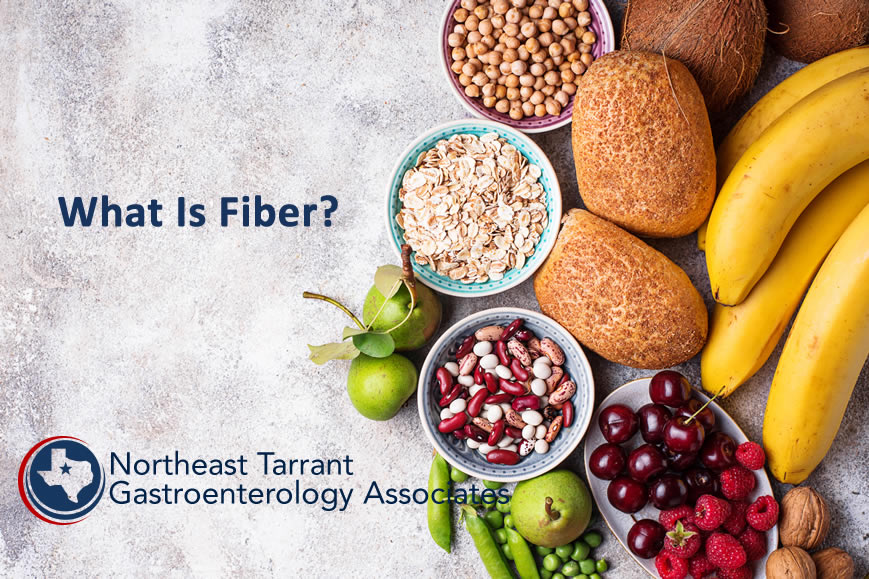FIBER
As gastroenterologists, a common topic of conversation with our patients is “fiber”. Questions range from “What is fiber?” to “Why is fiber important?” to “How much fiber do I need?”. In an effort to answer these questions, as well as a few others, please read on.
 What is fiber?
What is fiber?
Dietary fiber, frequently referred to as roughage, is essentially indigestible plant material. Unlike proteins, carbohydrates and fats, which are broken down and absorbed by your body, fiber passes through the GI tract undigested. Although fiber isn’t digested and absorbed, it does play a key role in keeping your digestive system functioning properly.
Are there different types of fiber?
There are 2 distinct types of fiber: “Soluble” and “Insoluble” and both have specific benefits
Soluble fiber: Dissolves in water and tends to form a gel-like substance which slows down how quickly food travels from the stomach to the intestines; thus, it can help with diarrhea. Additionally, as an added benefit, it can also help lower blood sugar and cholesterol levels. Good sources of soluble fiber include oats, beans, figs, berries, apples and pears.
Insoluble fiber: Does not dissolve in water and tends to make the stool soft and bulky. Unlike soluble fiber, insoluble fiber helps with constipation. Good sources of insoluble fiber include whole grains, corn, carrots, leafy vegetables, nuts and grapes.
Why is a high fiber diet important?
A high fiber diet includes many health benefits, including:
- Bowel regularity
- Overall maintenance of colon health (prevention of hemorrhoids and diverticular disease)
- Lower cholesterol levels
- Improved blood sugar control
- Weight loss and weight maintenance
How much fiber do I need in my diet?
The current recommendations are as follows:
Men
- 50 years old or younger: 38 grams daily
- 51 years old or older: 25 grams daily
Women
- 50 years old or younger: 25 grams daily
- 51 years old or older: 21 grams daily
What are some good fiber choices?
Good sources of fiber include whole grains, fresh fruits & vegetables, legumes (beans, peas, etc...) and seeds & nuts. Listed below are some common high fiber foods:
- Navy Beans (cooked): 19.1 g of fiber per cup
- Black Beans (cooked): 15 g of fiber per cup
- Raspberries: 8 g of fiber per cup
- Pears: 5.5 g of fiber in 1 medium pear
- Broccoli (cooked): 5.1 g of fiber per cup
- Spinach (cooked): 4.8 g of fiber per cup
- Apples: 4.4 g of fiber in 1 medium apple
- Oatmeal (cooked): 4 g of fiber per cup
- Corn (cooked): 4 g per cup
- Almonds: 3.5 g of fiber per ounce
- Kiwi fruit: 2.3 g of fiber per Kiwi
- Prunes: 2 g fiber per ounce
What if I can’t eat that much fiber every day?
For individuals who find it difficult to eat the recommended daily amount of fiber in a day, fiber supplements are a great way to add necessary fiber to your diet. There are supplements with soluble fiber and insoluble fiber; so, you can cater your fiber supplementation to your specific needs.
What about my fluid intake?
Fiber, whether taken in the form of dietary fiber or fiber supplements, requires plenty of fluid (i.e. water) to be effective. Not having enough water in your diet can actually cause fiber to constipate you. So, make sure to drink at least 6 to 8 glasses of water daily to help fiber do its job effectively.
We hope you found the above information helpful and informative. If you have further questions, please don’t hesitate to schedule an appointment with us. We look forward to seeing you!
OUR PHYSICIANS
Northeast Tarrant Gastroenterology Associates is comprised of Dr. Mark Murray, Dr. Eric Hill and Dr. Bryan Ong. They are all board-certified gastroenterologists who are also members of Digestive Health Associates of Texas (DHAT). They have two convenient office locations in Northeast Tarrant County (North Richland Hills and Ft. Worth) to serve your gastroenterology needs. They offer specialized services supporting the full spectrum of digestive healthcare, including screening colonoscopy.
Dr. Mark Murray earned his undergraduate degree at Texas A&M University and his M.D. degree at the University of Texas Health Science Center at Houston. He completed his internal medicine residency training at the University of Arkansas for Medical Sciences. He received his gastroenterology fellowship training at St. Louis University.
Dr. Eric Hill earned his undergraduate degree at Baylor University and his M.D. degree at the University of Oklahoma. He completed his internal medicine residency training at Vanderbilt University. He received his gastroenterology fellowship training at the University of South Florida.
CALL TODAY
817-284-2693

 Meet Dr. Mark Murray
Meet Dr. Mark Murray Meet Dr. Eric M. Hill
Meet Dr. Eric M. Hill Meet Dr. kevin Ho
Meet Dr. kevin Ho